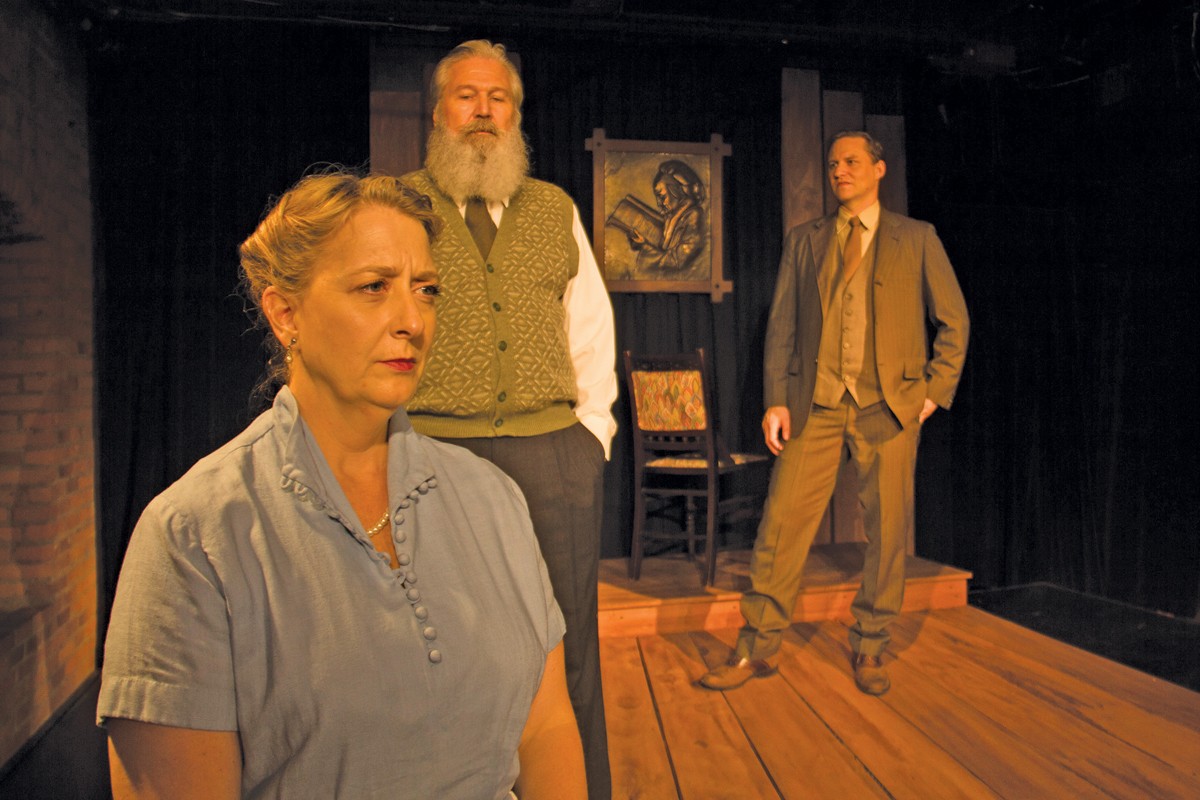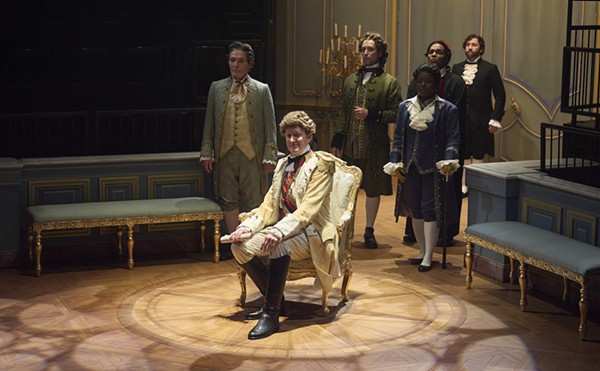This much is certain: In 1941, atomic physicists Werner Heisenberg, a German, and Niels Bohr, a Dane, met in Bohr's home in Copenhagen for a visit. World War II was raging across Europe. Denmark was an occupied country. Germany appeared invincible.
What is uncertain — what has tantalized historians, biographers and the science community for decades — is this: What, exactly, did the two physicists discuss? And more urgently, what impact, if any, did that conversation have on the development of the atomic bomb?
These are — at least superficially — the questions at the heart of Michael Frayn's Tony Award-winning play Copenhagen, which opened in London in 1998 and debuted on Broadway in 2000.
Dense, discursive, and (at nearly three hours in length) rich with provocative notions, the two-act play manages, however, to dig much deeper — into questions of truth, morality and the impact of science on both those who practice it and those who bear its consequences.
It is into this world of ambiguity that Cesear's Forum, a small theater collective led by founder and director Greg Cesear, now boldly treads. With its mission to produce unconventional plays of social, political or cultural importance, the company could scarcely have chosen a more fitting work. Expressionistic in structure, Copenhagen's characters are long dead, their dialog is unmoored in time and place, and their struggles unfold in a cozy, wood-paneled purgatory, created by set designer Michael Larochelle.
While small, the raked stage provides room for the actors to circle one another, like a probabilistic cloud of orbiting electrons spinning this way or that. And the performance space, in tiny Kennedy's Down Under at Playhouse Square, only adds to the intensity. The upshot is one of the most intimate performances you will see in Cleveland this year.
While Copenhagen's weirdness has historically drawn some grumblings from critics and audiences alike, the three-actor cast assembled here — comprising established veterans of the Cleveland theater scene — does a commendable job of illuminating the humanity inside this piece of historical fiction.
As Niels Bohr, one of the world's greatest theoretical physicists, head of the Bohr Institute and beloved mentor to many world-class scientists, Dana Hart — in long, bushy beard with silvery slicked back hair — gives us a complex, cautious but approachable academic who, during the course of the play, begins to visibly wilt beneath his burden of guilt, both personal and professional.
His adversary and former student, Werner Heisenberg (he of the "uncertainty principle"), is brought to life by Brian Bowers, who, despite stumbling over a few lines during opening night's performance, clearly articulates the anguish of a man eternally unsure of whether or not he did the right thing — or even of what "the right thing" was.
Between these two scientists and colleagues sits Bohr's wife, Margrethe. While the role is often described as an excuse for translating the inevitable scientific jargon into "plain language," Margrethe serves a much more important purpose. Especially as captured by Mary Alice Beck, Margrethe gives us the relentlessly human (and not always pretty) perspective on the motivations behind the men's often self-serving narratives.
In Frayn's telling, Heisenberg visits Bohr for help grappling with this dilemma: Does a physicist have a moral right to work on the exploitation of atomic energy? While the reality of the conversation between these three is unknowable, there is another certainty important to the storyline — despite the brilliant Heisenberg's ultimate efforts on his country's behalf, Germany never managed to produce an atomic weapon.
Why? Was Heisenberg simply incompetent, overlooking certain scientific truths and unable to quite literally "do the math"? It seems unlikely. Or did he intentionally subvert the program, underplaying the likelihood of success and keeping critical information from his superiors? Risky business, at best.
Frayn suggests yet another possible explanation. If Heisenberg did hide important scientific knowledge from his superiors, perhaps he also hid it from himself. By consciously choosing to not know what he did not know — by bluffing himself into ignorance — Heisenberg may very well have saved millions of lives.
The irony, of course, is that Heisenberg's professional reputation never recovered from the stigma of working for the Nazis. Meanwhile, Bohr is smuggled out of Denmark, lands at Los Alamos, and plays a direct role in the destruction of Hiroshima and Nagasaki. Yet in the history books, Bohr is a hero.
The story of the past is, indeed, written by the victors. But then, what becomes of heroism? If the uncertainty principle tells us anything, it is that causality is an illusion. As Heisenberg says in the second act, "... if you don't know how things are today, you certainly can't know how they are going to be tomorrow." How then, can we decide on a path of action? What really governs our choices?
From here, the questions multiply like a chain reaction. Is everything subjective, as Margrethe claims?
Do the ends really justify the means, as Heisenberg suggests?
Is the notion of Truth just a convenient ruse, dogma against which we stick our preconceived notions?
Does our Truth change, depending on where we look, what we remember, and the narrative we wish to tell? "So many explanations for what I did!" cries Heisenberg. "A million things we might do or might not do every day. All we can do is look afterward and see what happened."
If that holds, what then should we make of "moral dilemmas"? Who gets to have them? Are they merely an artifact of privilege, available only to those who hold sufficient power to actually make decisions?
Can we ever understand what drives others? Can we ever understand ourselves?
For a play about physics, Copenhagen provides a deep dive into the darkness of the human soul.













